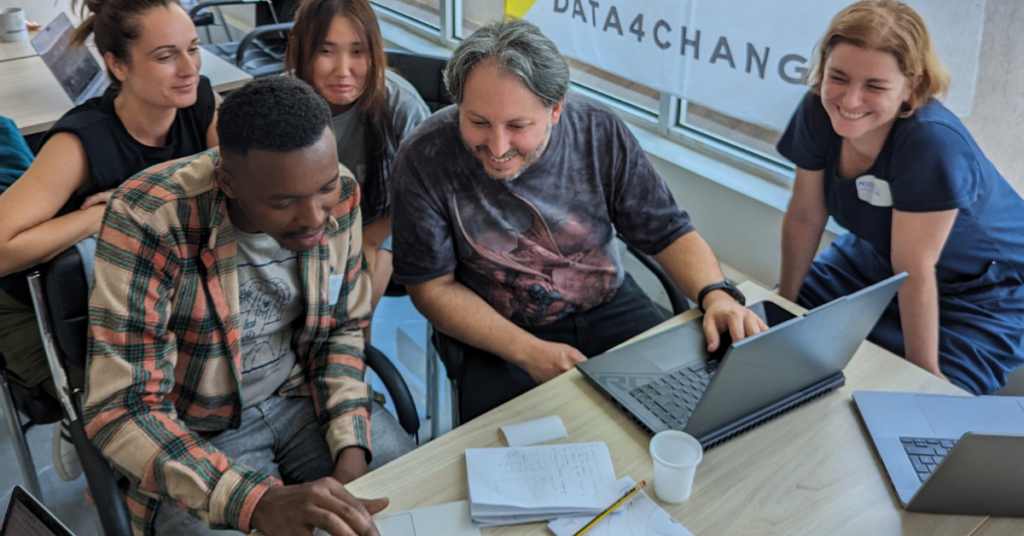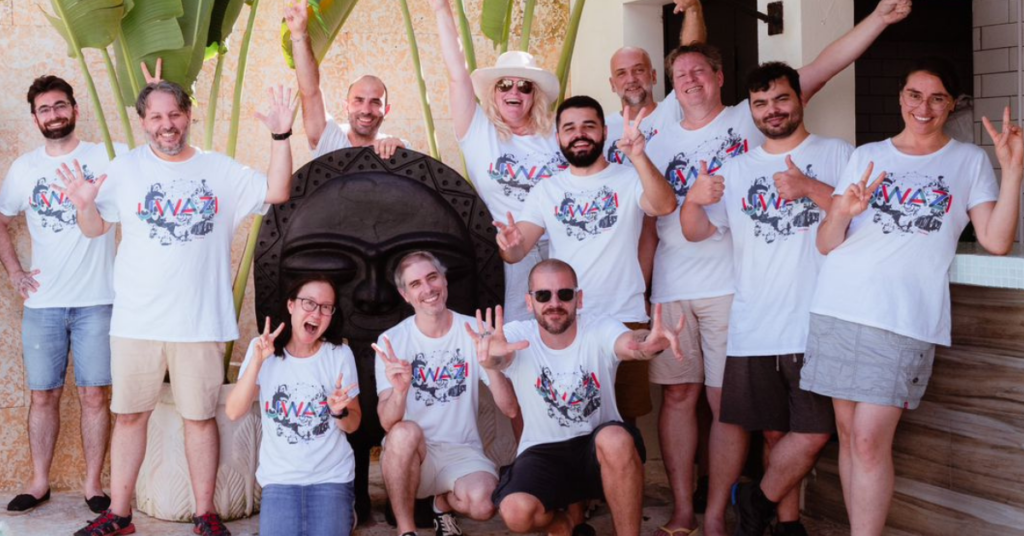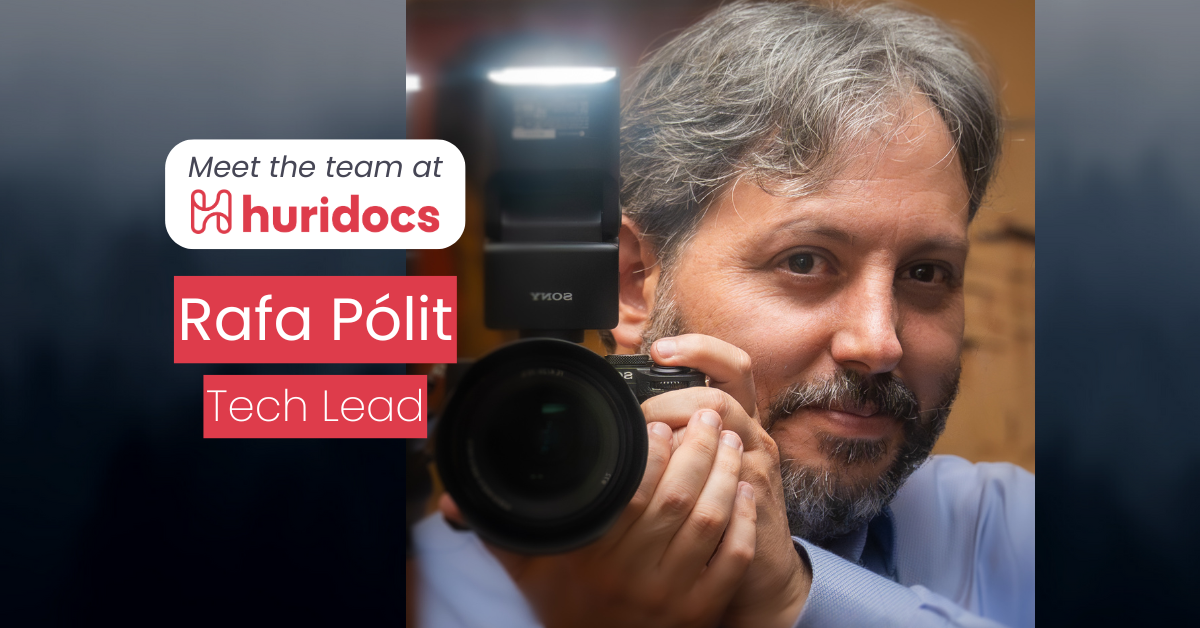Enjoy the article as a narrated audio reading by Rafa.
For me, the motivation to work at HURIDOCS has always been tied to the idea of the “greater good.” Contributing to society in some way, whether through processes or tools that have the potential to drive change, has always been my primary motivation.
My career path is quite unique because I didn’t study programming or anything similar. I studied architecture, driven by my interest in 3D animation and multimedia, which weren’t offered as structured academic programmes at the time. However, that period coincided with the early days of widespread internet access, and my interests quickly shifted towards web development. After many years working as a freelance web developer, creating websites and CMSs, I formally joined a private company to work on an ERP (a business accounting system). Just a few months later, we began developing an educational platform, a project I worked on for nearly four years.
During that time, I worked with colleagues from Spain with whom I formed an excellent professional relationship and a close personal friendship. In 2016, we joined HURIDOCS within a few months of each other. At that time, HURIDOCS outsourced its development work to external contractors. Initially, they asked us to develop a mobile app for reporting human rights violations in the Philippines. The interaction was natural and seamless, and shortly afterwards, we were invited to establish an in-house development team at HURIDOCS.
I believe that, for all of us, transitioning from the corporate sector to an NGO was the biggest motivator. We faced exciting challenges in creating a platform from scratch using cutting-edge technology—often untested in production environments. We had to invent new paradigms, create data structures tailored to the human rights context, and design novel processes for searching and interpreting data. This technological challenge was appealing, and today, we have a complex codebase that includes structures dating back nine years alongside newer elements reflecting recent industry changes. While technological challenges persist, it’s the socio-political impact of our work that motivates me to keep innovating and to hear the feedback from users on the front lines of the fight against human rights violations.
“As developers, it’s easy to focus solely on problems or what should work differently or better, but when successful use cases come in, it’s exhilarating.”
— Rafa Pólit
At first, we were full-stack developers, handling a bit of everything in the organisation: infrastructure, backend, frontend—you name it. We were a small team responsible for the entire product. As the team grew and the codebase became more complex, the need for specialisation emerged. This led to the formation of distinct capabilities within the team: one side focusing on the mid-and long-term product vision (now the Product team), and the other on specialised development teams for backend, frontend, and infrastructure. Along with this specialisation came the need for two-way communication to align the needs and progress of each team with the Product team.
The role of the Tech Lead

In general, the application reflects the influence of many people designing a complex system. That said, there are areas of Uwazi that I consider almost like “my own children.”
One such example is the “hub” system for relationships, which fills me with pride. At the time, it addressed a series of needs that couldn’t be resolved with simple relationship systems and required inferring additional relationships based on connections between documents. For several years, this has been a versatile and functional solution. Its replacement has been in development for almost three years and is still not complete.
Another highlight is the customisation capability we’ve developed for Uwazi, which I’m very proud of. Our platform can be used in its generic form or customised to look like any page the client envisions. This flexibility allows Uwazi to avoid imposing a specific “look” on users, enabling NGOs and organisations to tell their stories in a creative and unique way.
The Tech Lead role emerged from the need to, on one hand, provide an overarching vision of the project and, on the other, integrate the various teams involved in development. Before the inclusion of a Product Manager, the Tech Lead served as the developers’ representative to the Product team, acted as a liaison with the Programmes team to communicate new developments and gather requirements, and coordinated timelines and priorities. Today, many of these responsibilities have been taken over by the Product Manager, a critical addition to the team.
Currently, aside from being a full-time backend developer, I also focus on explaining the technology in a way that’s accessible to those who may not have specific knowledge of our platform or the technologies we use. The goal is to be an ambassador for Uwazi, sharing all the technical knowledge with a user base focused on fighting human rights violations and translating this knowledge into accessible language, as I did during the interview for GitHub’s Open Source Friday.
This is a continually evolving process. With new team members and technological challenges, we constantly evaluate the best ways to contribute to the process. We are in a phase of transition and growth.
Personal motivation

Personally, what motivates me most is HURIDOCS’ social commitment to human rights. Knowing that we’re contributing to an organisation that provides tools for people on the front lines of human rights advocacy is invaluable.
“When people ask me what I do, I don’t focus on software development. Instead, I say that I work for an organisation dedicated to documenting human rights violations. I think it’s a subtle difference, but it says a lot about how I feel about my contribution to the space where I work.”
— Rafa Pólit
On a day-to-day level, working for an NGO like HURIDOCS also brings unique benefits. The flexibility and remote work options the organisation offers, as well as its focus on personal well-being, make me happy. I also deeply value the diversity of our partners, both geographically and culturally. This has allowed me to learn about realities, challenges, and even places that I wouldn’t have otherwise encountered. Through all of this, I’ve been able to see beyond my immediate reality and open my mind to different perspectives.
Read the article in Spanish here.
